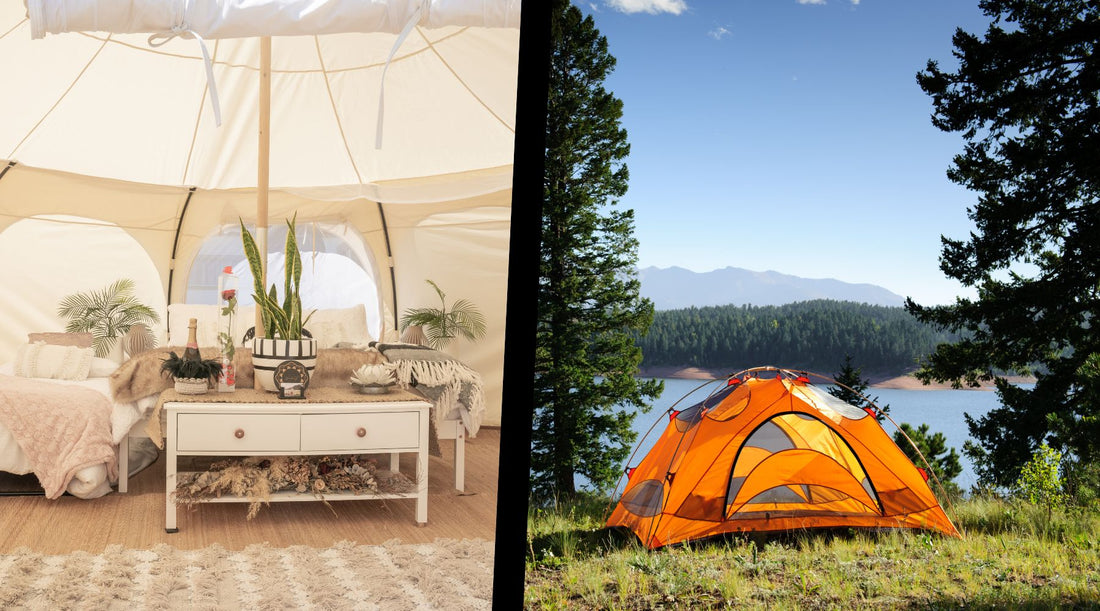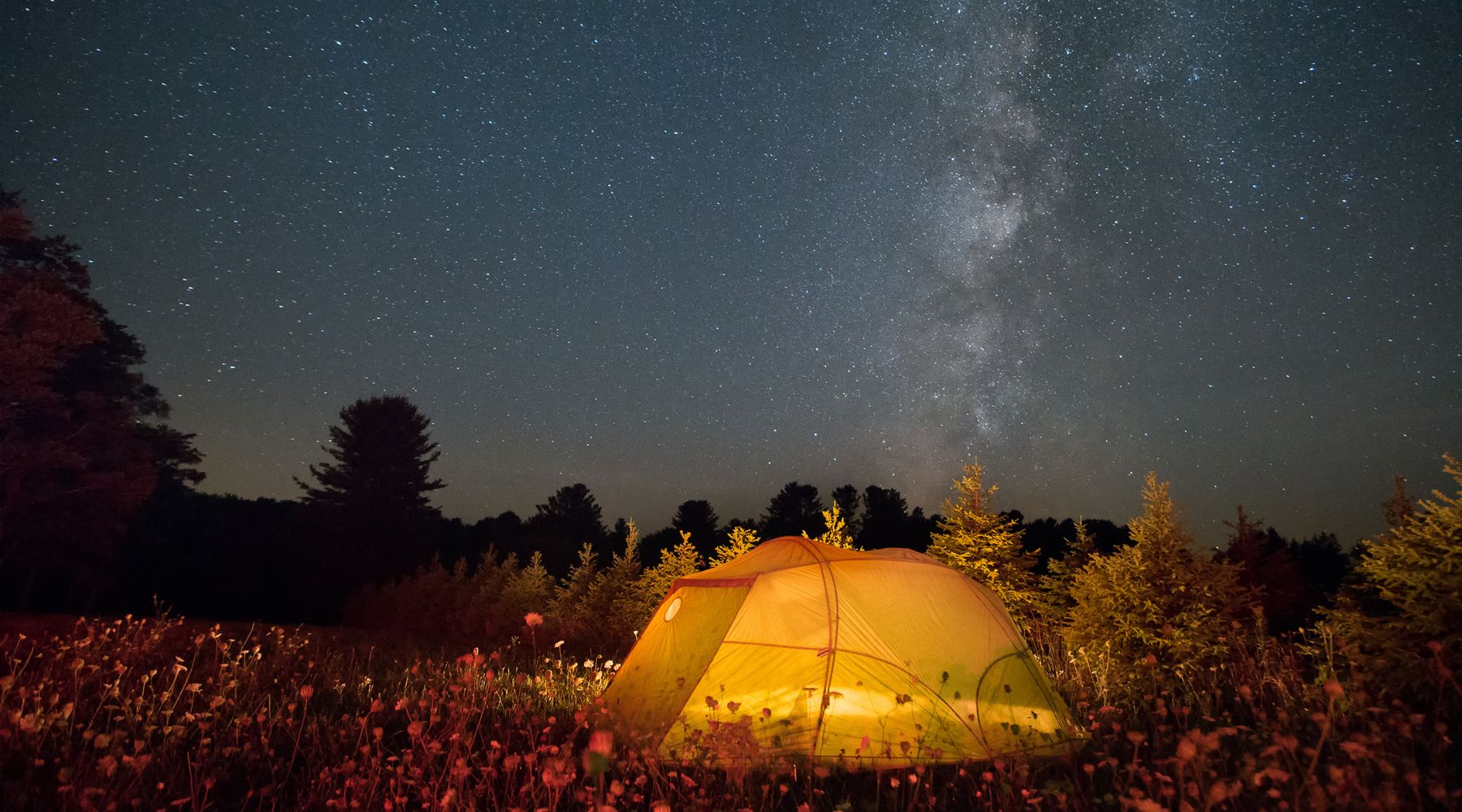When it comes to experiencing the great outdoors, there are two popular options that cater to different tastes and preferences: camping and glamping. While both activities allow you to reconnect with nature and escape the hustle and bustle of everyday life, they offer distinct experiences and accommodations. Camping brings to mind images of pitching tents, building campfires, and immersing oneself in the raw beauty of the wilderness. On the other hand, glamping conjures up visions of luxurious tents, comfortable amenities, and indulgence amidst stunning natural landscapes.
In this article, we delve into the differences between camping and glamping, exploring the unique features, advantages, and considerations of each. Whether you're a seasoned outdoor enthusiast or someone looking for a new adventure, understanding the distinctions between these two approaches can help you make an informed decision and select the ideal outdoor experience that aligns with your preferences.
Join us as we compare the essentials of camping and glamping, examining factors such as accommodations, amenities, activities, costs, and more. By the end of this article, you'll have a comprehensive understanding of what sets camping and glamping apart, empowering you to choose the experience that best suits your desires for an unforgettable outdoor getaway.
What is Camping?
Camping is a traditional outdoor activity that involves setting up temporary shelters, typically tents, in natural settings such as forests, mountains, or campgrounds. It is rooted in the idea of embracing the simplicity of nature and self-sufficiency. The essence of camping lies in disconnecting from the modern world and immersing oneself in the great outdoors.
When camping, individuals are responsible for pitching their tents, starting campfires, and preparing their meals. This self-reliance fosters a sense of adventure and self-discovery. Campers often engage in activities like hiking, fishing, stargazing, and storytelling around the campfire. Camping allows people to appreciate the beauty of nature, breathe in fresh air, and reconnect with the simpler aspects of life.
What is Glamping?
Glamping, a portmanteau of "glamorous camping," takes a different approach to the outdoor experience. It offers a fusion of the natural world and the luxuries and comforts typically associated with upscale accommodations. Glamping introduces a touch of extravagance and sophistication to the camping experience.
In contrast to traditional camping, glamping provides unique and often extravagant accommodations such as yurts, safari tents, eco-lodges, or even fully furnished cabins and treehouses. These structures are designed to offer the comfort and amenities of a hotel room while still allowing guests to be surrounded by nature. Glamping sites may feature private bathrooms, comfortable bedding, stylish furnishings, and sometimes even spa facilities or gourmet dining options.
Glamping aims to create a more curated and refined atmosphere, providing a balance between the beauty of nature and the conveniences of modern living. It appeals to individuals who desire a connection with the outdoors but also seek the comfort and luxury of upscale accommodations. Glamping offers an opportunity to enjoy the serenity of nature without compromising on comfort or convenience.
Accommodations and Facilities
Camping
Camping accommodations typically involve setting up tents. These can range from basic dome tents to more advanced models like cabin tents or rooftop tents. The type of tent chosen depends on factors such as the number of campers, weather conditions, and personal preferences. Tents provide a sense of closeness to nature, allowing campers to hear the sounds of wildlife and feel the gentle breeze.
In terms of facilities, campgrounds often offer shared amenities. These may include communal bathrooms with toilets and showers, water stations for drinking and washing, and designated cooking areas equipped with picnic tables and fire pits or portable camping stoves. Some campgrounds also provide amenities like electricity hook-ups, laundry facilities, and camp stores where essential supplies can be purchased.
Camping enthusiasts often bring their own camping gear and equipment, including sleeping bags, camping mattresses or sleeping pads, camping chairs, cooking utensils, coolers, and portable grills. The self-sufficiency required in camping fosters resourcefulness and adaptability, as campers learn to make the most of their surroundings and limited resources.
Glamping
Glamping accommodations offer a departure from traditional tents, providing guests with more luxurious and comfortable options. These accommodations can include fully furnished safari tents, geodesic domes, yurts, Airstream trailers, or even treehouses. Glamping sites often prioritize aesthetics and provide an immersive and unique experience.
Unlike camping, glamping accommodations are typically pre-set and ready for guests upon arrival. They come with amenities that promote comfort, such as real beds with comfortable mattresses, cozy seating areas, and often stylish furnishings that reflect the surrounding nature. Some glamping accommodations may also feature en-suite bathrooms, kitchenettes, and private decks or patios.
Glamping sites often provide additional conveniences to enhance the guest experience. These can include electricity to power devices, heating or air conditioning units for temperature control, and sometimes even Wi-Fi access. Glamping allows guests to enjoy the beauty of the outdoors without sacrificing the comforts of modern living.
In summary, camping involves setting up tents and embracing a more basic lifestyle, while glamping offers unique and luxurious accommodations that prioritize comfort and style. Both options allow individuals to experience the outdoors, but they cater to different preferences and comfort levels. Whether one chooses camping or glamping depends on the desired level of connection with nature and the desired amenities and comforts during the outdoor adventure.
Experience and Atmosphere
Camping
Camping provides a back-to-nature experience that allows individuals to fully immerse themselves in the outdoors. The simplicity and ruggedness of camping create an atmosphere of adventure and exploration. By pitching tents and cooking over campfires, campers actively engage with their surroundings and develop a deeper connection to nature.
Camping offers opportunities for activities like hiking, fishing, kayaking, or simply exploring the natural beauty of the surroundings. The absence of modern distractions encourages campers to appreciate the serenity and tranquility of the outdoor environment. Campgrounds often have designated areas for campfires, where families and friends gather to share stories, roast marshmallows, and enjoy the warmth and ambiance of the flames under the starlit sky.
Camping fosters a sense of self-reliance and resourcefulness. Campers learn essential survival skills, such as setting up tents, starting fires, and cooking meals using minimal resources. The outdoor experience encourages problem-solving, adaptability, and a greater appreciation for the simpler aspects of life.
Glamping
Glamping offers a unique blend of outdoor experience and luxurious comfort. It allows individuals to enjoy the beauty of nature without sacrificing modern conveniences. The atmosphere in a glamping site is carefully curated to provide a refined and distinctive setting.
Glamping accommodations often provide a comfortable and stylish retreat. Guests can relax in well-appointed interiors, enjoying comfortable beds and plush seating areas. The attention to detail in furnishings and decor creates an ambiance that reflects the natural surroundings while maintaining a touch of elegance.
While glamping offers a high level of comfort, it still encourages guests to embrace the outdoors. Many glamping sites are situated in scenic locations, allowing guests to enjoy breathtaking views, wildlife sightings, and outdoor activities. Glampers can indulge in hiking, cycling, birdwatching, or simply unwinding in the peaceful surroundings.
Glamping also caters to those who appreciate fine dining and unique culinary experiences. Some glamping sites offer gourmet meals prepared by professional chefs using locally sourced ingredients. This culinary aspect adds an extra element of luxury to the glamping experience.
Cost and Accessibility
Camping
Camping is generally more affordable compared to glamping. The costs associated with camping primarily include camping gear, campground fees, and food supplies. Camping gear can be a one-time investment that can be used for multiple camping trips, making it a cost-effective option in the long run. Campground fees vary depending on the location and amenities provided, but they tend to be more budget-friendly compared to glamping accommodations.
Camping also offers greater accessibility in terms of location options. Campgrounds are often widely available, ranging from national parks and state parks to privately owned campgrounds. These locations are spread across various regions, providing campers with flexibility in choosing a destination that suits their preferences and travel distance.
Glamping
Glamping, on the other hand, tends to be more expensive compared to traditional camping. The luxurious accommodations and additional amenities come at a higher cost. Glamping sites often require a higher upfront payment, and the prices can vary depending on the level of luxury and exclusivity offered.
Glamping accommodations are typically located in scenic and sought-after destinations, which can contribute to their higher costs. These locations may include private estates, coastal areas, or remote wilderness settings, providing guests with a unique and picturesque experience.
While glamping may have a higher price tag, it offers a more convenient and hassle-free experience. Guests don't need to invest in camping gear or spend time setting up tents. The amenities provided and the level of service offered by glamping sites make it a popular choice for those seeking a comfortable and convenient outdoor getaway.
Flexibility and Customization
Camping
Camping offers a high level of flexibility and customization. Campers have the freedom to choose their camping spot within the campground, allowing them to select a location that suits their preferences, such as proximity to water, shade, or scenic views. They can also adapt their camping experience based on the desired level of privacy or social interaction, as campgrounds often offer a range of camping sites from secluded spots to group camping areas.
Camping allows individuals to tailor their experience according to their interests and activities. Whether it's setting up a cozy campsite, organizing outdoor games, or planning nature hikes, campers have the flexibility to create their itinerary and engage in activities that align with their preferences and group dynamics.
Glamping
Glamping also offers a certain degree of flexibility and customization, albeit in a different way. While the accommodations themselves are pre-set, glamping sites often provide a variety of additional services and amenities that can be customized based on guest preferences.
Glamping sites may offer add-on services such as guided tours, outdoor excursions, spa treatments, or private dining experiences. Guests can choose to engage in these activities and experiences based on their interests and preferences. The level of customization in glamping allows individuals to curate their experience and make it more tailored to their specific desires.
Additionally, glamping sites may offer different accommodation options, each with its unique features and amenities. Guests can choose the type of accommodation that best suits their preferences, whether it's a safari tent, a cozy cabin, or a luxurious treehouse. This variety allows for personalization and customization based on individual tastes and desires.
Social Aspect and Community
Camping
Camping has a strong social aspect, fostering connections and a sense of community among campers. Campgrounds often provide communal spaces, such as picnic areas, campfire pits, and shared facilities, where campers can interact and engage with fellow outdoor enthusiasts. These spaces create opportunities for shared meals, storytelling, and bonding experiences.
Camping also offers the chance to connect with nature as a group or family. It encourages quality time spent together, away from the distractions of technology and everyday routines. Campers can engage in group activities like hiking, fishing, or playing outdoor games, strengthening their relationships and creating lasting memories.
Many campgrounds organize group activities or events, such as nature walks, stargazing sessions, or educational programs, that allow campers to socialize and learn from each other. These activities promote a sense of camaraderie and provide opportunities for campers to exchange knowledge, stories, and experiences.
Glamping
While glamping may not have the same communal atmosphere as camping, it still offers social aspects that cater to a different kind of experience. Glamping sites often provide common areas, such as dining spaces or lounges, where guests can gather and interact. These spaces create opportunities for guests to socialize, share experiences, and connect with like-minded individuals.
Glamping also offers the option for group bookings or family getaways, allowing guests to enjoy the luxurious accommodations and amenities together. Guests can engage in shared activities, dine together, or simply relax and enjoy each other's company in the comfortable surroundings of the glamping site.
Furthermore, some glamping sites organize curated experiences or events that encourage socialization and connection. These can include wine tastings, cooking classes, or cultural workshops, providing guests with opportunities to interact, learn, and create meaningful connections with others.
The Right Choice for You
The decision between camping and glamping ultimately comes down to personal preferences, desired level of comfort, and the type of experience one seeks. Both options offer unique advantages and cater to different needs and expectations.
If you enjoy the simplicity of nature, self-reliance, and an immersive outdoor experience, camping may be the ideal choice for you. Camping allows you to connect with nature, learn essential survival skills, and create lasting memories through shared activities and the sense of adventure.
On the other hand, if you prefer a more luxurious and comfortable outdoor experience without compromising on the beauty of nature, glamping may be the perfect fit. Glamping offers a range of amenities, stylish accommodations, and curated experiences that allow you to relax and indulge in the natural surroundings while enjoying the conveniences of modern living.
Ultimately, whether you choose camping or glamping, the goal is to immerse yourself in nature, create cherished memories, and appreciate the beauty of the great outdoors.


